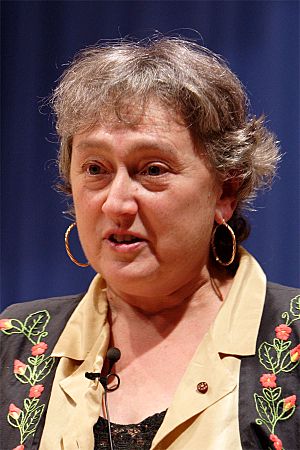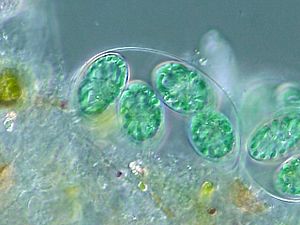Lynn Margulis facts for kids
Quick facts for kids
Lynn Margulis
|
|
|---|---|

Margulis in 2005
|
|
| Born |
Lynn Petra Alexander
March 5, 1938 |
| Died | November 22, 2011 (aged 73) Amherst, Massachusetts, U.S.
|
| Nationality | American |
| Alma mater | |
| Known for | |
| Spouse(s) |
|
| Children |
|
| Awards |
|
| Scientific career | |
| Fields | Biology |
| Institutions | |
| Thesis | An Unusual Pattern of Thymidine Incorporation in Euglena (1965) |
| Doctoral advisor | Max Alfert |
| Influences | Ivan Wallin, Konstantin Mereschkowski |
Lynn Margulis (born Lynn Petra Alexander; March 5, 1938 – November 22, 2011) was an American evolutionary biologist. She was a leading scientist who showed how important symbiosis (living together) is for evolution.
One historian said that Lynn Margulis's name is as connected to symbiosis as Charles Darwin's is to evolution. Margulis changed how we understand how cells with a nucleus (like ours!) evolved. She suggested they formed when different bacteria joined together.
Margulis also helped create the Gaia hypothesis with British chemist James Lovelock. This idea suggests that Earth works like a single, self-regulating system. She also strongly supported the idea of classifying living things into five main groups.
Throughout her career, some of Margulis's ideas were met with strong disagreement. Her important paper, "On the Origin of Mitosing Cells," was rejected by about fifteen journals before it was published in 1967. Her theory that mitochondria and chloroplasts (parts inside cells) were once independent bacteria was largely ignored for ten years. It became widely accepted only after strong genetic evidence supported it.
Margulis was chosen as a member of the U.S. National Academy of Sciences in 1983. President Bill Clinton gave her the National Medal of Science in 1999. The Linnean Society of London awarded her the Darwin-Wallace Medal in 2008.
Margulis was a strong critic of neo-Darwinism, which is a modern view of Darwin's theory. Her work on symbiosis and her endosymbiotic theory built on ideas from earlier scientists. She helped make sure their contributions were recognized. Many of her major books for the public were written with her son, Dorion Sagan. In 2002, Discover magazine named Margulis one of the 50 most important women in science.
Contents
About Lynn Margulis
Lynn Margulis was born in Chicago, Illinois, in 1938. She was the oldest of four daughters. Her father was a lawyer, and her mother ran a travel agency. She went to high school in Hyde Park and later attended the University of Chicago Laboratory Schools at age fifteen.
She earned her bachelor's degree from the University of Chicago in 1957. She then studied biology at the University of Wisconsin. She earned her master's degree in genetics and zoology in 1960. Her first published work was about the genetics of Euglena, which are tiny living things that have features of both animals and plants.
Margulis continued her research at the University of California, Berkeley. In 1964, she began teaching at Brandeis University in Massachusetts. She received her PhD from the University of California, Berkeley, in 1965.
In 1966, she moved to Boston University, where she taught biology for 22 years. She became a full professor in 1977. In 1988, she became a Distinguished Professor at the University of Massachusetts at Amherst. She held this position until her death.
Personal Life and Beliefs
Margulis married astronomer Carl Sagan in 1957. They had two sons, Dorion Sagan and Jeremy Sagan. They divorced in 1964. In 1967, she married Thomas N. Margulis. They had a son, Zachary, and a daughter, Jennifer. They divorced in 1980.
Lynn Margulis was an agnostic, meaning she did not claim to know if God exists. She strongly believed in evolution. However, she disagreed with some parts of the modern view of evolution, called the modern evolutionary synthesis. She believed that "natural selection eliminates and maybe maintains, but it doesn't create." She thought that symbiosis was the main force driving evolutionary change.
Margulis died on November 22, 2011, at her home in Amherst, Massachusetts, after a stroke. Her ashes were scattered in her favorite research areas near her home.
Key Scientific Ideas
Endosymbiosis Theory

In 1966, Margulis wrote a paper called "On the Origin of Mitosing Cells." This paper was rejected by many science journals before it was finally published. Today, it is seen as a very important paper in modern endosymbiotic theory.
Margulis was known for pushing her ideas forward, even when others disagreed. The idea that mitochondria came from bacteria and chloroplasts came from cyanobacteria was proven in 1978. This was the first experimental proof for her theory. The endosymbiosis theory became widely accepted in the early 1980s. This happened after scientists found that the genetic material in mitochondria and chloroplasts was very different from the cell's main nuclear DNA.
Symbiosis as an Evolutionary Force
Margulis disagreed with ideas of evolution that focused only on competition between living things. She emphasized how important symbiotic, or cooperative, relationships are between different species.
She believed that these symbiotic relationships were the main force behind evolution. She also thought that genetic variation (differences in genes) happened mostly when genetic information was shared between bacterial cells or viruses and eukaryotic cells. While her ideas about cell parts (organelles) are now widely accepted, her broader idea that symbiosis explains most genetic variation is still debated.
Margulis felt that some views of Neo-Darwinism focused too much on competition. She believed that history would see these views as a "minor twentieth-century religious sect." She argued that "Neo-Darwinism... is in a complete funk" because it only focuses on slow changes from gene-level natural selection.
Gaia Hypothesis
One of the first important papers on the Gaia hypothesis was written by Margulis and James Lovelock in 1974. They defined the hypothesis as: "The idea of the biosphere as an active adaptive control system able to maintain the Earth in homeostasis we are calling the 'Gaia hypothesis.'"
This paper suggested that living organisms completely control how the planet regulates itself. Later, as the idea grew, scientists realized that this planetary self-regulation is a natural result of the Earth system. This includes life and its physical environment working together. In her 1998 book Symbiotic Planet, Margulis explored how Gaia connects to her work on symbiosis.
Five Kingdoms of Life
In 1969, life on Earth was classified into five kingdoms by Robert Whittaker. Margulis became the most important supporter of this system. She was also the first to see its limits, especially for classifying microbes.
However, new discoveries, like archaea, and new ways of classifying based on molecules, challenged the five-kingdom idea. By the mid-2000s, most scientists began to agree that there were more than five kingdoms. Margulis became the strongest defender of the five-kingdom classification. She did not accept the three-domain system that became widely accepted.
Margulis created a changed classification system. In her system, all life forms, including newly discovered ones, could fit into the classic five kingdoms. For example, she placed archaea in the kingdom Prokaryotae, along with bacteria. Her ideas are detailed in her book Five Kingdoms, written with Karlene V. Schwartz. It is believed that the five-kingdom system still exists today mainly because of Margulis.
Awards and Honors
Lynn Margulis received many awards and honors for her scientific work:
- 1975: Elected Fellow of the American Association for the Advancement of Science.
- 1978: Received a Guggenheim Fellowship.
- 1983: Elected to the National Academy of Sciences.
- 1986: Awarded the Miescher-Ishida Prize.
- 1989: Given the Commandeur de l’Ordre des Palmes Académiques de France.
- 1999: Received the William Procter Prize for Scientific Achievement.
- 1999: Awarded the National Medal of Science by President Bill Clinton.
- 2001: Received the Golden Plate Award from the American Academy of Achievement.
- 2002–2005: Received the Alexander von Humboldt Prize.
- 2005: Elected President of Sigma Xi, The Scientific Research Society.
- 2008: One of thirteen people to receive the Darwin-Wallace Medal from the Linnean Society of London. This medal was previously given only every 50 years.
- 2010: Received the NASA Public Service Award for Astrobiology.
- She also received honorary doctorates from 15 universities.
See also
 In Spanish: Lynn Margulis para niños
In Spanish: Lynn Margulis para niños
 | Frances Mary Albrier |
 | Whitney Young |
 | Muhammad Ali |

